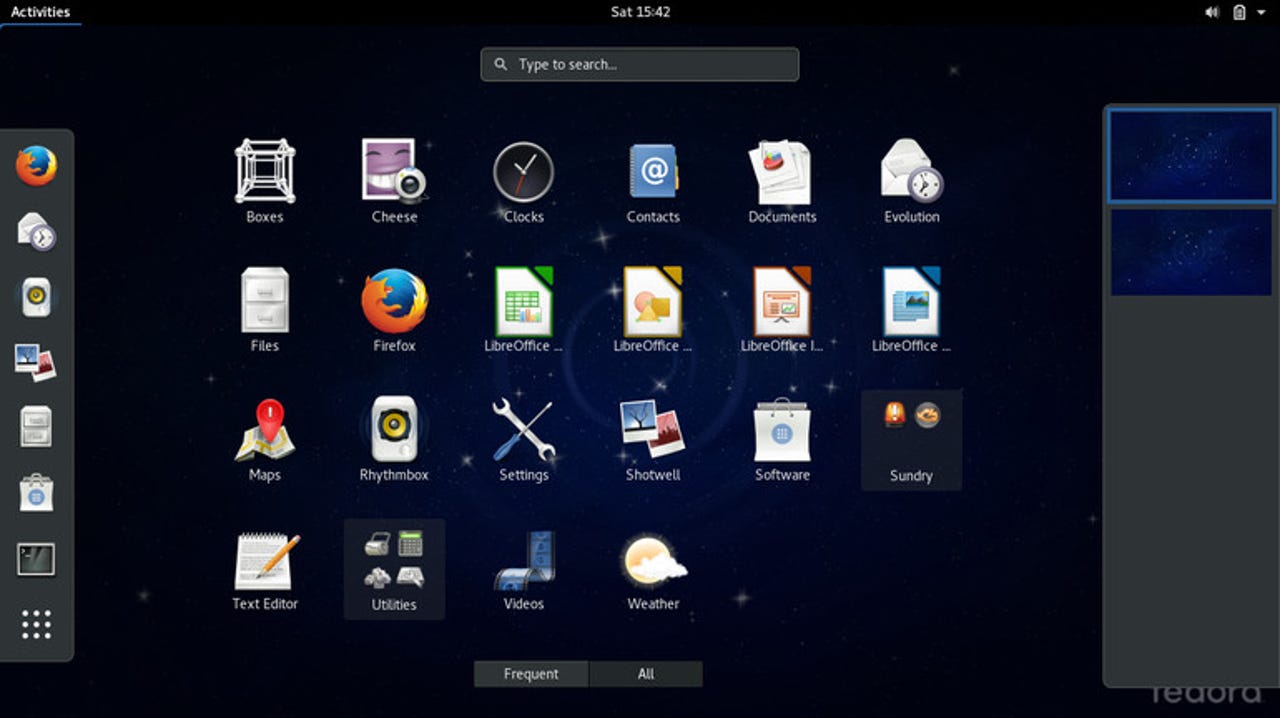Fedora 24 shows off new visions of the Linux desktop, cloud, and containers

One of open-source developers' favorite Linux distributions, Red Hat's community Linux distribution, has a new release: Fedora 24. While best known as a Linux desktop, the new Fedora -- as with previous recent releases -- is made up of three base packages that form the foundation of three separate editions: Fedora 24 Cloud, Fedora 24 Server, and Fedora 24 Workstation.

The new Fedora Linux distribution, Fedora 24, uses GNOME 3.2 for its default desktop.
Fedora 24 arrives almost a month late, but all three versions boast the glibc 2.23 compilers for better performance and improvements to POSIX compliance and GNU Compiler Collection (GCC) 6. Every package has been rebuilt with GCC 6. This delivers better code optimization and performance across all editions and improved overall stability.
This new Fedora is based on the 4.5.7 Linux kernel. While enhanced features and bug fixes have been delivered for all editions, Fedora 24 emphasizes new tools and capabilities for developers seeking to better leverage Linux containers and orchestration technologies, like Kubernetes.
Let's look at each edition.
Fedora Cloud 24
Fedora Cloud 24 now includes OpenShift Origin for Fedora. This Kubernetes-based cloud distribution is optimized for application development, automating deployment, operations, and containerized applications scaling.
Fedora 24 is also the foundation for Fedora Atomic Host, a lightweight platform designed for the sole purpose of running containerized Docker applications. It includes package enhancements and bug fixes and a new "developer mode."
In this developer mode, the host is automatically downloaded and starts Cockpit along with tmux, a terminal multiplexer session. This makes it much easier to start working in the Fedora Atomic Host developer console. It also streamlines the ability to capture key session information, like the IP address and root password.
Fedora 24 Workstation
Fedora's newest desktop includes numerous package and component tweaks. The most interesting addition is a preview of GNOME 3.20, Delhi. While I'm not a GNOME 3 fan, this latest iteration of the GNOME 3 desktop environment looks interesting.
You don't have to use GNOME. There are five other desktops included in the official Fedora "spins." These include KDE Plasma 5, MATE 1.14, Xfce 4.12, LXDE 0.99.1, and -- my personal favorite -- Cinnamon 2.6.
It also comes with a technology preview of Wayland, a next-generation X display server. But, alas, Wayland is not yet ready for prime time. Fedora developers still plan to fully implement it as the default graphics server for future versions of Fedora. I'm not holding my breath.
As usual, the new Fedora Workstation boasts the latest version of common desktop programs. For example it comes with the LibreOffice 5.1.4 office-suite, Shotwell 0.23.1 photo editor, and Firefox 47 web browser.
Fedora 24 Server
Showing that Linux really is heading to the cloud, the new server doesn't include a lot of new features. The most noteworthy of them, at first glance, is it makes better use of rolekit to simplify setting up server roles.
Linux: Breakfast of Champions
Another nice new feature is FreeIPA 4.3, an excellent and open-source identity management program. This version has an improved Domain Controller, which will help streamline replica installation, segment creation, and replica topology visualization. Finally, the overall footprint of Fedora Server has been made smaller by removing unneeded packages.
All-in-all, Matthew Miller, Fedora's Project Leader, summed up the latest Fedora well: "Fedora 24 continues Fedora's drive to provide the latest, powerful open source tools and components to a variety of end users, from developers to systems administrators. With the addition of OpenShift Origin to Fedora 24 Cloud, Fedora users now have an additional powerful tool to not only build but also deploy and orchestrate many of the latest innovations in Linux containers."
Related Stories: